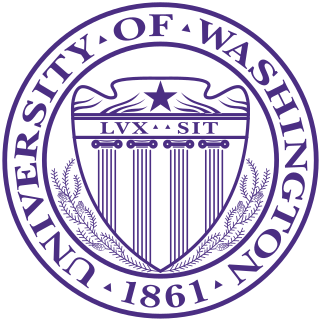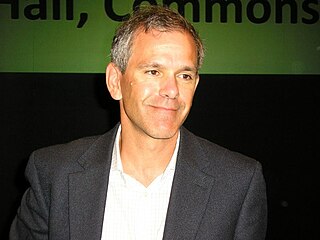Related Research Articles

The University of Washington is a public research university in Seattle, Washington. Founded in 1861, approximately a decade after the founding of Seattle, the University of Washington is one of the oldest universities on the West Coast of the United States.

The United States President's Emergency Plan For AIDS Relief (PEPFAR) is a United States governmental initiative to address the global HIV/AIDS epidemic and help save the lives of those suffering from the disease. Launched by U.S. President George W. Bush in 2003, as of May 2020, PEPFAR has provided about $90 billion in cumulative funding for HIV/AIDS treatment, prevention, and research since its inception, making it the largest global health program focused on a single disease in history until the COVID-19 pandemic. PEPFAR is implemented by a combination of U.S. government agencies in over 50 countries and overseen by the Global AIDS Coordinator at the United States Department of State. As of 2023, PEPFAR has saved over 25 million lives, primarily in sub-Saharan Africa.

Mark Allen Emmert is the former president of the National Collegiate Athletic Association. He was the fifth CEO of the NCAA; he was named as the incoming president on April 27, 2010, and assumed his duties on November 1, 2010, and remained in office until March 1, 2023.

The University of Wisconsin–La Crosse is a public university in La Crosse, Wisconsin. Established in 1909, it is part of the University of Wisconsin System and offers bachelor's, master's, and doctoral degrees. With 9,600 undergraduate and 1,000 graduate students, UW-La Crosse is composed of four schools and colleges offering 102 undergraduate programs, 31 graduate programs, and 2 doctoral programs. UW-La Crosse has over 95,000 alumni across all 50 U.S. states and 57 countries as of 2021.

The University of Washington School of Public Health is the only public health school located in the Northwest, and is based on the main campus of the University of Washington in Seattle, Washington. The School is accredited through the Council on Education for Public Health (CEPH). It ranks among the United States' best schools for public health. U.S. News & World Report ranked the school sixth among all public health schools in its last survey of this discipline (2014).

The University of Alabama at Birmingham Marnix E. Heersink School of Medicine is a public medical school located in Birmingham, Alabama, United States with branch campuses in Huntsville, Montgomery, and at the University of Alabama College of Community Health Sciences in Tuscaloosa. Residency programs are also located in Selma, Huntsville and Montgomery. It is part of the University of Alabama at Birmingham (UAB).
The Michael G. Foster School of Business at the University of Washington is the business school of the University of Washington in Seattle. Founded in 1917 as the University of Washington School of Business Administration, the school was the second business school in the western United States.
The Global Burden of Disease Study (GBD) is a comprehensive regional and global research program of disease burden that assesses mortality and disability from major diseases, injuries, and risk factors. GBD is a collaboration of over 3600 researchers from 145 countries. Under principal investigator Christopher J.L. Murray, GBD is based in the Institute for Health Metrics and Evaluation (IHME) at the University of Washington and funded by the Bill and Melinda Gates Foundation.

The University of Washington School of Medicine (UWSOM) is a large public medical school in the northwest United States, located in Seattle and affiliated with the University of Washington. According to U.S. News & World Report's 2022 Best Graduate School rankings, University of Washington School of Medicine ranked #1 in the nation for primary care education, and #7 for research.

The University of Wisconsin School of Medicine and Public Health (UWSMPH) is a professional school for the study of medicine and public health at the University of Wisconsin–Madison. It is one of only two medical schools in Wisconsin, along with the Medical College of Wisconsin in Milwaukee, and the only public one.

The Milken Institute School of Public Health is the school of public health of the George Washington University, in Washington, DC. U.S. News & World Report University Rankings ranks the Milken SPH as the 11th best public health graduate program in the United States.

Christopher Murray is an American physician, health economist, and global health researcher. He is a professor at the University of Washington in Seattle, where he is Chair of Health Metrics Science and the director of the Institute for Health Metrics and Evaluation (IHME).

The Institute for Health Metrics and Evaluation (IHME) is a research institute working in the area of global health statistics and impact evaluation at the University of Washington in Seattle. The Institute is headed by Christopher J.L. Murray, a physician and health economist, and professor at the University of Washington Department of Global Health, which is part of the School of Medicine. IHME conducts research and trains scientists, policymakers, and the public in health metrics concepts, methods, and tools. Its mission includes judging the effectiveness and efficacy of health initiatives and national health systems. IHME also trains students at the post-baccalaureate and post-graduate levels.

Agnes Binagwaho is a Rwandan Politian, pediatrician and co-founder and the former vice chancellor of the University of Global Health Equity (2017-2022). In 1996, she returned to Rwanda where she provided clinical care in the public sector as well as held many positions including the position of Permanent Secretary for the Ministry of Health of Rwanda from October 2008 until May 2011 and Minister of Health from May 2011 until July 2016. She has been a professor of global health delivery practice since 2016 and a professor of pediatrics since 2017 at the University of Global Health Equity. She resides in Kigali.

The University of Washington School of Social Work is the social work school of the University of Washington, a public research university in Seattle, Washington.
Dr. Debrework Zewdie, former director of the World Bank Global AIDS Program and Deputy Executive Director and COO of the Global Fund, is an Ethiopian national who has led strategy, policy implementation, and management of development programs at country, regional, and global levels for international bodies such as the World Bank and The Global Fund to Fight AIDS, Tuberculosis and Malaria. As an immunologist, she conceptualized and managed the groundbreaking US$1 billion Multi-country HIV/AIDS Program that changed the AIDS funding landscape and pioneered the large-scale multi-sectorial response with direct financing to civil society and the private sector. Dr. Zewdie led the articulation of the World Bank's first global strategy on HIV/AIDS and the Global HIV/AIDS Program of Action. As a founding UNAIDS Global Coordinator, she has been instrumental in making the unique cooperative structure of the UNAIDS family a working reality, fostering strong inter-agency partnerships. She is an advocate for women's health and was a founding vice president and member of the Society for Women and AIDS in Africa (SWAA). She established institutional rigor at the Global Fund and led its wide-ranging internal reform which culminated in the ongoing corporate transformation program. Dr. Zewdie has a Ph.D. in clinical immunology from the University of London, a postdoctoral fellowship at SYVA Company, and was a Senior MacArthur Fellow at the Harvard Center for Population and Development Studies. Dr. Zewdie was a Richard L. and Ronay A. Menschel Senior Leadership Fellow at the Harvard T.H. Chan School of Public Health in 2015. During her Fellowship at the Harvard Chan School, she also participated as a speaker on Voices in Leadership, an original webcast series, in a discussion titled, "Leadership in Getting AIDS on the World Bank Agenda", moderated by Dr. Barry Bloom.

Michelle Ann Williams is a Jamaican-American epidemiologist, public health scientist, and educator who has served as the dean of the Harvard T. H. Chan School of Public Health since 2016.
Azita Emami is a Linda Koch Lorimer Professor and the Dean of Nursing at Yale School of Nursing since 2023. She is the former Robert G. and Jean A. Reid Dean of Nursing at the University of Washington from 2018 to 2023. She is also a Fellow of the American Academy of Nursing.

Patricia Jannet García Funegra is a Peruvian professor of public and global health at Cayetano Heredia University. She originally trained as a clinician before focusing on research and public health. Her work also focuses on reproductive health, sexually transmitted diseases, and medical informatics. In 2016-17 García was the Minister of Health of Peru. She was the first Peruvian to be elected to the US National Academy of Medicine in 2016.

Matthew Sparke is a geographer and scholar of globalization whose work addresses global health, citizenship, neoliberalism, geopolitics, and border studies. He is a Professor of Politics at the University of California Santa Cruz, where he co-directs an interdisciplinary program in Global and Community Health.
References
- ↑ Perry, Nick. “UW to add global health studies.” The Seattle Times, 24 June 2005, (accessed July 17, 2009).
- ↑ Paulson, Tom. “UW gets global-health shot in the arm $30 million from Gates Foundation.” Seattle Post-Intelligencer, 19 Jan. 2006, (accessed July 17, 2009).
- ↑ Department of Global Health brochure, 2010
- ↑ Paulson, Tom. “Concern over new UW department.” Seattle Post-Intelligencer, 17 Feb. 2006, (accessed July 17, 2009).
- ↑ Erkkinen, Meghan. “Student voices an issue.” The Daily of the University of Washington, 23 Feb. 2006, (accessed July 17, 2009).
- ↑ Engleman, Eric. “UW signs lease at Seattle’s South Lake Union.” Puget Sound Business Journal (Seattle), 11 Jan. 2006, (accessed July 17, 2009).
- ↑ Paulson, Tom. “UW picks Holmes to lead new global health program.” Seattle Post-Intelligencer, 8 Sept. 2006, (accessed July 17, 2009).